Hillary Clintonâs Benghazi testimony: 11-hour marathon, partisan squabbling
By the numbers
Welcome to Trail Guide, your daily host through the wilds of the 2016 presidential campaign. It's Thursday, Oct. 22, and here's what we're watching:
- Hillary Rodham Clinton's testimony before the House Benghazi committee was a feat of endurance but elicited little new information
- Committee chairman Trey Gowdy quickly worked to defend the panel
- Clinton confidant Sidney Blumenthal came up repeatedly. Who, exactly, is he?
- Among the day's theatrics: stacks of Clinton's emails
- Marco Rubio arrives in L.A. for a fundraiser even as some have assailed him for missing votes in Washington
- Go inside the summer of Joe Biden's deliberation and what led to his decision not to run for president
- Who gives money to a billionaire? The Times' Mark Z. Barabak and Michael Finnegan look at Donald Trump's donors
- Trump also offered an apology Thursday -- for an intern's Twitter slip-up
#ClearlyHillaryisResponsible becomes a thing on Twitter
After Hillary Rodham Clinton was grilled Thursday for 11 hours over the 2012 attack on a U.S. diplomatic compound in Benghazi, Libya, several hashtags emerged on Twitter.
Among them: #clearlyhillaryisresponsible
As Clinton seeks the Democratic presidential nomination, Republicans have criticized her as being responsible for the attack.
Many of the tweets associated with the hashtag were light-hearted.
Here's a sample:
The marathon Benghazi hearing wraps
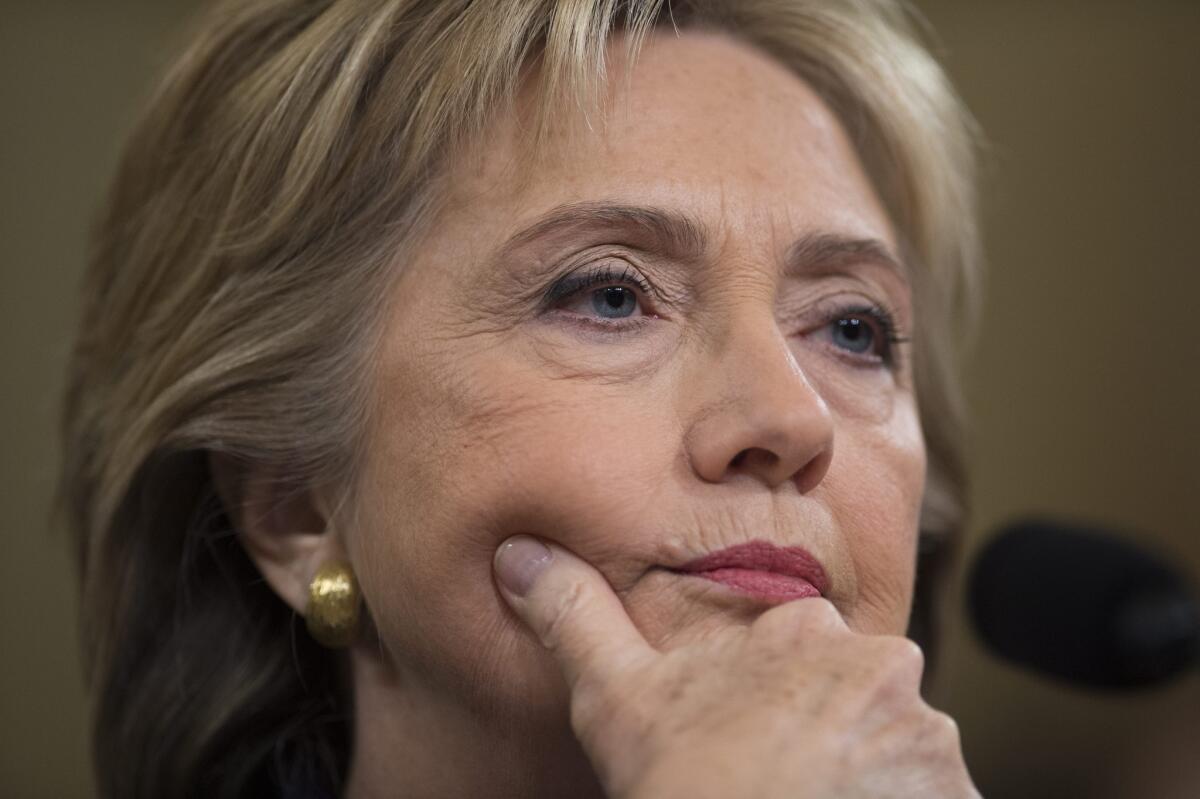
Former secretary of State and Democratic presidential candidate Hillary Rodham Clinton appears before the House Select Committee on Benghazi in Washington.
Hillary Rodham Clinton's marathon Benghazi testimony wended from morning to noon to night Thursday, ending after 11 hours of back-and-forth with committee members -- and little new information.
As The Times' Evan Halper and David Lauter write, Clinton was calm and smiling throughout. Other than a brief coughing fit at hour 10, she showed no signs of tiring.
Clinton's California assist
Two lawmakers from California on the House Benghazi committee, Adam Schiff and Linda Sanchez, were prominent at Thursday's hearing, giving Hillary Clinton a boost by asking her relatively easy questions and sympathizing with her over her scuffles with Republicans.
And in the process, they helped themselves, too, thanks to all the screen time they got, the Times' Christine Mai-Duc reports:
Even a crack in Clinton's armor proves to be a sign of strength
Marathon Clinton testimony continues. Is anyone still watching?
Marco Rubio, absent from Washington, set to attend L.A. fundraiser
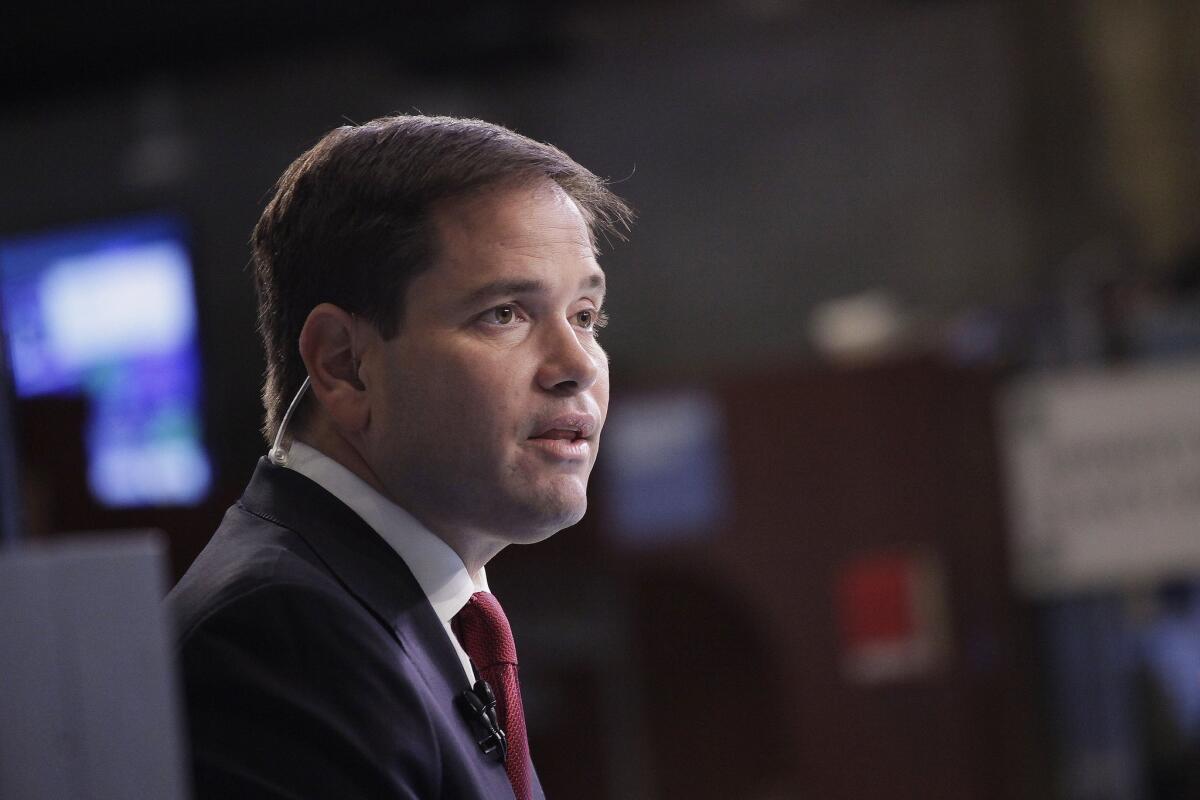
Sen. Marco Rubio is set to attend a fundraising reception Thursday night in Los Angeles, even as rivals have assailed him for missing votes in Washington to campaign across the country.
The event, hosted by asset manager Josh Friedman and his wife, Beth, requires a donation of $2,700 per person and $5,400 per couple. Attendees include Tony Pritzker, whose sister, Penny, was national finance chair to President Obama's 2008 campaign and is the current secretary of commerce.
In recent weeks, former Florida Gov. Jeb Bushâs campaign has raised questions about Rubioâs time away from the Senate. And Donald Trump, the billionaire businessman and front-runner for the GOP nomination, has said Rubio has the âworst voting record in the United States Senate.â
âHe's never there, meaning he doesn't work or he's too lazy to go back and vote," Trump said on CNN recently.
On Thursday, Rubio did miss a handful of procedural votes.
Among 2016 presidential hopefuls who reside in the Senate, Rubio has missed more votes than those such as Sens. Ted Cruz of Texas and Lindsey Graham of South Carolina, according to an analysis by Politifact.
For his part, Rubio has not wavered in light of the criticism and has toggled between Washington and time in early voting states such as Iowa and Nevada.
"When I miss a vote or two in Washington, it's not because I'm on vacation, it's because I'm running for president," he told reporters while in New Hampshire this month.
Earlier this week, Rubio stood on the floor of the Senate and castigated Veterans Affairs employees for not doing their jobs and causing problems for the nationâs veterans.
âIf you work at the VA and you aren't doing your job, they get to fire you,â he said.
Times staff writer Seema Mehta contributed to this report.
Will hearing shift public opinion? Republicans think not
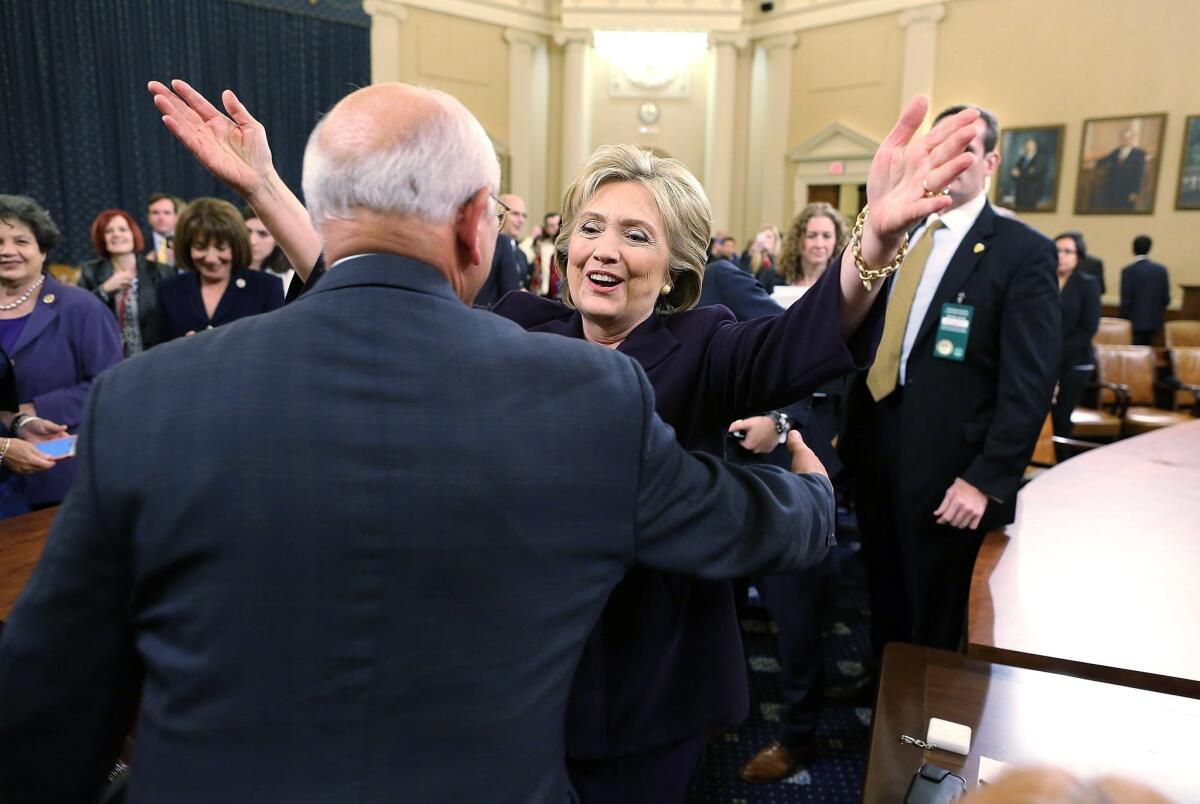
WASHINGTON, DC - OCTOBER 22: Democratic presidential candidate and former Secretary of State Hillary Clinton greets a man during a break of a hearing before the House Select Committee on Benghazi October 22, 2015 on Capitol Hill in Washington, DC. The committee held a hearing to continue its investigation on the attack that killed Ambassador Chris Stevens and three other Americans at the diplomatic compound in Benghazi, Libya, on the evening of September 11, 2012. (Photo by Chip Somodevilla/Getty Images) ** OUTS - ELSENT, FPG, CM - OUTS * NM, PH, VA if sourced by CT, LA or MoD **
As Hillary Clinton spent hours testifying about the attacks in Benghazi, even Republican members of Congress doubted Thursday's hearings would substantially shift public opinion.
"Some people are, of course, of a mindset to believe everything Hillary Clinton says," said Rep. Dave Reichert, a Washington state Republican. "Some people are of a mindset to believe everything the committee says. So those minds may not be changed, but those that are more open to listening to debate, it might have swayed some people either way."
That small group of undecided listeners did not include lawmakers. In fact, most House members who do not serve on the House Select Committee on Benghazi said they had seen only snippets of the testimony between votes and meetings.
"Unfortunately, the left in our country has made everything preeminently political and the truth be damned," said Rep. Trent Franks, an Arizona Republican. "If we focus on the truth, it'll ultimately be best for the country, regardless of the outcome."
But Democrats clearly felt they had gained the upper hand after watching Clinton take a political pounding for months.
"If anybody is swayed, it may be those who are more in the middle on the politics, who don't have firm commitments on the politics and see this as a cynical exercise," said Rep. David Price, a North Carolina Democrat. "But I think a lot of people had concluded that already."
Rep. Elijah Cummings of Maryland, the Democratic leader of the committee, pointed to questions about Sidney Blumenthal, a Clinton confidant, as an example of the committee's loss of focus.
"We have drifted away from four members of our diplomatic corps, who died," he said during a break. "If you're a family member and you're sitting out there waiting for answers to your questions, you're going to have wonder why it is that the first questions that come forth are about somebody who knows nothing about Benghazi, never been to Libya."
Say cheese?
Donald Trump offers an apology -- kind of
Donald Trump offered an apology of sorts on Thursday after his Twitter account retweeted an item that could be viewed as offensive to Iowans.
Trump retweeted a posting from a supporter who said "too much #Monsanto in the #corn creates issues in the brain," in regard to a new poll that shows Dr. Ben Carson outpacing Trump in the Hawkeye State.
In a followup tweet, Trump offered an apology from an unnamed campaign intern who was tweeting on his behalf.
Iowans kick off voting in the 2016 election cycle in February, and offending voters in the state is not in Trump's best interests.
Despite the new Quinnipiac poll showing Carson at 28% and Trump at 20%, the billionaire businessman is still leading in an average of several polls in the state.
Who is Sidney Blumenthal?
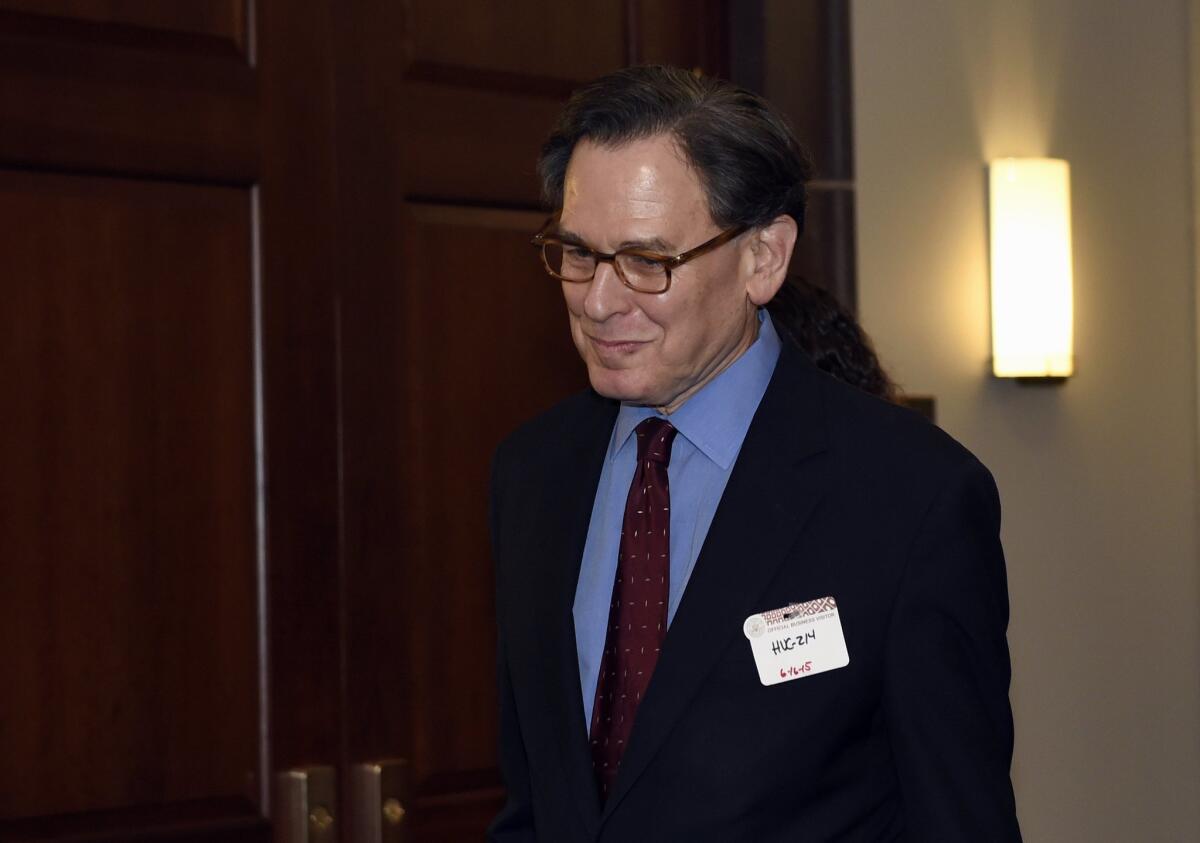
Sidney Blumenthal, a longtime confidant to former President Bill Clinton and Democratic presidential candidate Hillary Rodham Clinton arrives on Capitol Hill in Washington, Tuesday, June 16, 2015, to face questions from the Republican-led House panel investigating the deadly 2012 attacks in Benghazi, Libya. (AP Photo/Susan Walsh)
Whenever there is controversy around the Clintons, Sidney Blumenthal often finds his way into the story. Thursday, his role in advising â or not advising â Hillary Rodham Clinton while she was secretary of State became the sharpest flash point of her testimony before the House Benghazi Committee.
Blumenthal, 66, first made headlines during President Clinton's administration, where he served as an advisor with a close relationship to Hillary Clinton. An adamant Clinton defender, he was accused during the Monica Lewinsky scandal of planting stories in the media that Lewinsky, a former White House intern, was the president's "stalker." He was also accused of spreading information to discredit independent prosecutor Ken Starr and his staff and was called to testify before the grand jury investigating the president. As the impeachment unfolded, he pushed the notion that a "vast right-wing conspiracy" was behind Bill Clinton's problems.
Before that, he had been a journalist for decades, writing in a number of publications including the New Yorker, the New Republic, and the Washington Post.
He shows up often, as an all-purpose correspondent, in Hillary Clinton's emails from her tenure at the State Department. Many of his messages involved scathing critiques of Republican politicians, including House Speaker John A. Boehner, and political advice, such as a caution flag that Republican nominee Mitt Romney might invoke the Benghazi attacks to damage President Obama in the 2012 presidential election.
"Thanks. I'm pushing to WH," Clinton responded, using shorthand for the White House.
He also offered advice on his views on the situation in Libya, which Clinton would often pass on to aides, asking them to weigh in on the advice without saying that it came from Blumenthal.
"Sid Blumenthal was not my advisor â official or unofficial â about Libya," Clinton testified Thursday. "On occasion, I did forward what he would send me to make sure it was in the mix."
Blumenthal was not a State Department employee, having been denied a position because of objections from the Obama administration. (The New York Times reported at the time that Rahm Emanuel, then White House chief of staff, suspected him of promoting attacks against Obama during the election.) Blumenthal did, however, work for the Clinton Foundation as an advisor, according to the newspaper. He was at times employed by Democratic groups doing opposition research against Republicans, paving the way for Clinton's run for president.
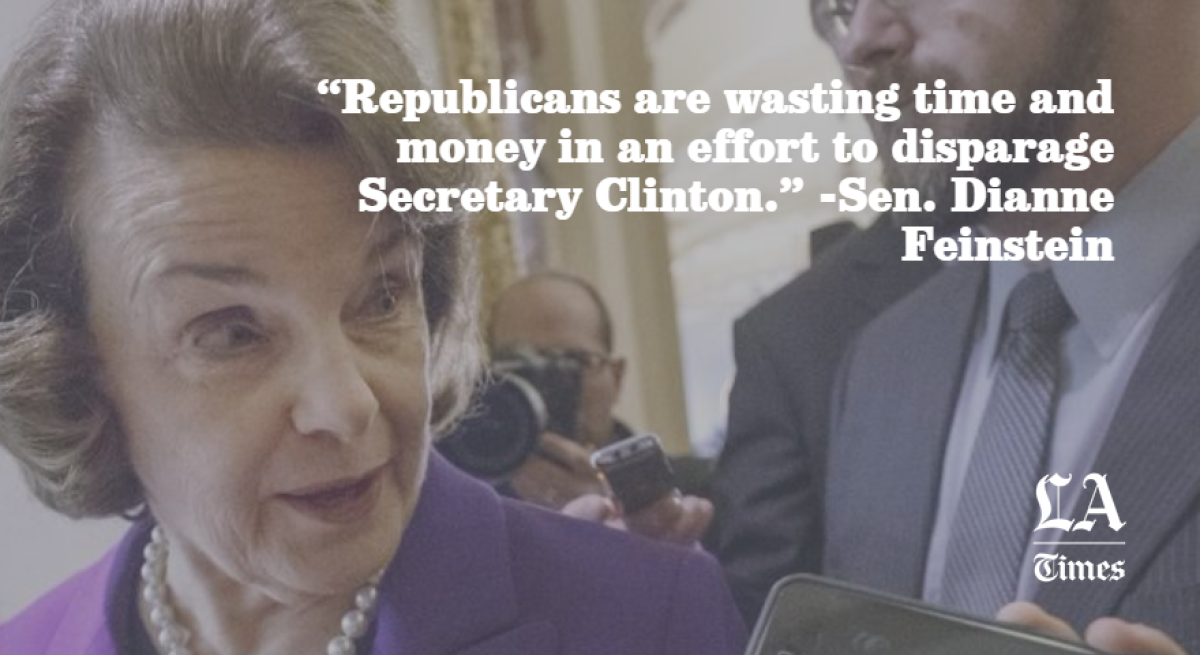
Hillary Clinton testifies, but focus turns to Sidney Blumenthal
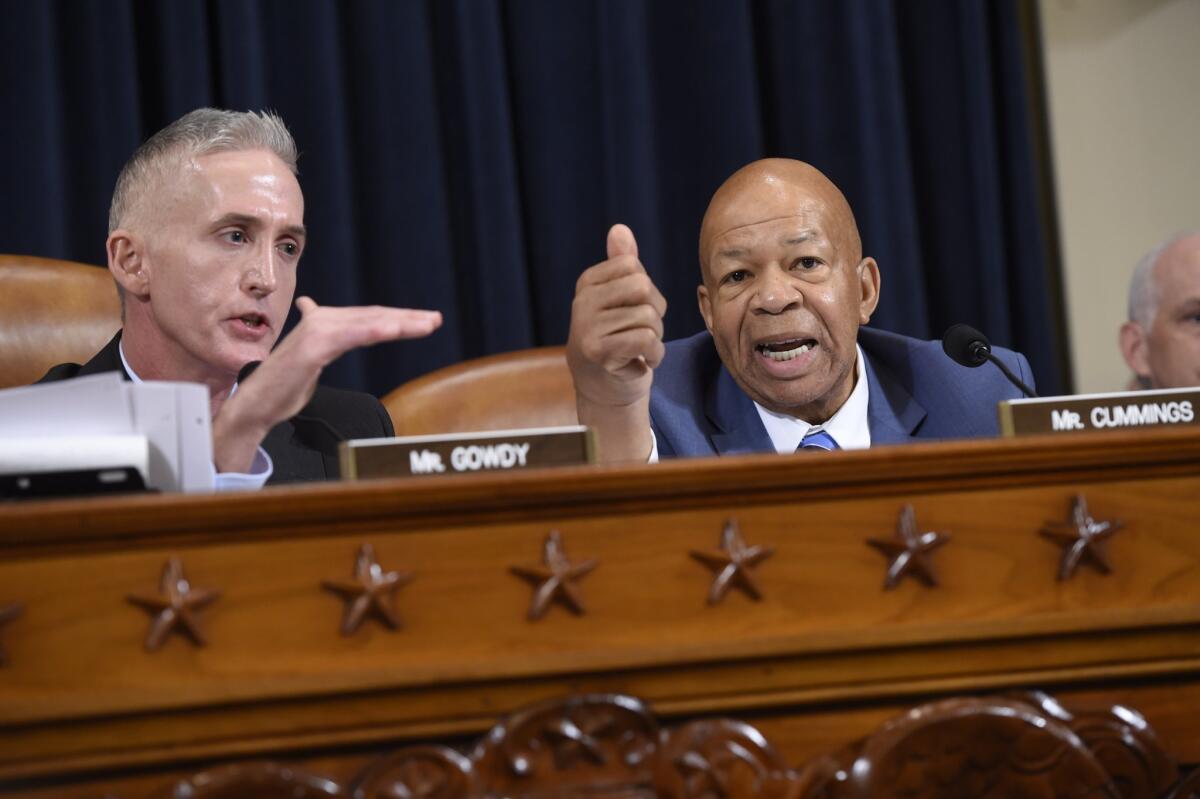
Republican US Representative from South Carolina Trey Gowdy (L) argues with Democratic US Representative Elijah Cummings during questioning of former US Secretary of State and Democratic Presidential hopeful Hillary Clinton as she testifies before the House Select Committee on Benghazi on Capitol Hill in Washington, DC, October 22, 2015. AFP PHOTO / SAUL LOEBSAUL LOEB/AFP/Getty Images ** OUTS - ELSENT, FPG, CM - OUTS * NM, PH, VA if sourced by CT, LA or MoD **
All about Hillary? The Benghazi Select Committee appears to have become all about Sidney -- as in Sidney Blumenthal, the longtime Clinton confidant who appeared to email her regularly.
During his first round of questioning for the former secretary of State, Rep. Lynn Westmoreland (R-Ga.) noted that Blumenthal clearly had Clinton's personal email address and wondered if Ambassador J. Christopher Stevens, who died in the Benghazi attacks, did as well.
"If I had been Mr. Stevens and I had had a relationship with you, and I had requested 20 or more times for additional security to protect not only my life but the people that were there with me, I would have gotten in touch with you some way," he said.
Clinton said she did not believe Stevens had her email address but that he had a direct line to key officials at the State Department. "He was in constant contact with people," she said.
Next, Rep. Mike Pompeo (R-Kan.) wondered why Clinton did not personally see hundreds of cables that included requests for additional security while 150 of Blumenthal's emails "reached your desk."
"You asked for more of them. You read them. You corresponded with him," he said of her emails with Blumenthal. "And yet the folks that worked for you didn't have the same courtesy."
Clinton repeated that Blumenthal was simply a friend who "sent me information he thought might be of interest."
"Some of it was, some of it wasn't. Some of it I forwarded to be followed up on," she said. "The professionals and experts who reviewed it found some of it useful, some of it not. He had no official position in the government. And he was not at all my advisor on Libya."
And then Rep. Trey Gowdy (R-S.C.), the panel's chairman, picked up the torch from his colleagues, using his first exchange with Clinton to methodically question why Blumenthal seemed to play such an important role without a formal position in the administration, noting his connections to the Clinton Foundation and to Democratic-affiliated groups.
He said that Clinton forwarded information from his emails to other State Department or administration officials, often without identifying him as the source.
"Our ambassador was asked to read and respond to Blumenthalâs drivel," Gowdy said.
But he noted Clinton did not forward emails from Blumenthal that seemed to criticize the president or other officials.
"I don't know what this line of questioning does to help us get to the bottom of the death of four Americans," Clinton responded at one point.
Blumenthal is among the witnesses with ties to Clinton who have been called to testify before the committee in private.
In the batches of Clinton emails released each month by the State Department, Blumenthal's name is among those that appear most frequently. His notes were sometimes personal but more often included detailed memos on global hotspots, with intelligence culled from his own sources. He also offered advice -- most often seemingly unsolicited -- about how Clinton could leverage world events to boost her public standing.
Democrats at various points used their questioning time to try to correct what they portrayed as misleading Republican points, and the hearing descended into a procedural fight when the panel's top Democrat sought approval for entering the transcript of Blumenthal's full testimony into the record.
As the committee members squabbled, Clinton watched with a mix of amusement and confusion, rubbing her temples as the spectacle went on.
Clinton: 'I've lost more sleep than all of you put together' over Benghazi
You might call it a softball from Rep. Adam B. Schiff (D-Burbank).
After the California congressman issued a scathing assessment of a committee he said has proven to be a "partisan exercise," Schiff turned to ask Clinton a friendly question on the stated purpose of the inquiry into the deaths of four Americans in Benghazi, including Ambassador J. Christopher Stevens.
"I know the ambassador was a friend of yours, and I wonder if you would like to comment on what it's like to be the subject of an allegation that you deliberately interfered with security that cost the life of a friend?" Schiff asks.
Clinton was more than prepared to answer, calling the accusation "personally painful."
"I would imagine I've thought more about what happened than all of you put together," she said of the panelâs 12 members. "I've lost more sleep than all of you put together. I have been racking my brain about what more could have been done or should have been done."
"I will continue to speak out and do everything I can from whatever position I'm in to honor the memory of those we lost."
A pro-Clinton group quickly distributed video of the answer, calling it "one of the most personal moments of the hearing."
Benghazi hearing audience includes more than a few members of Congress
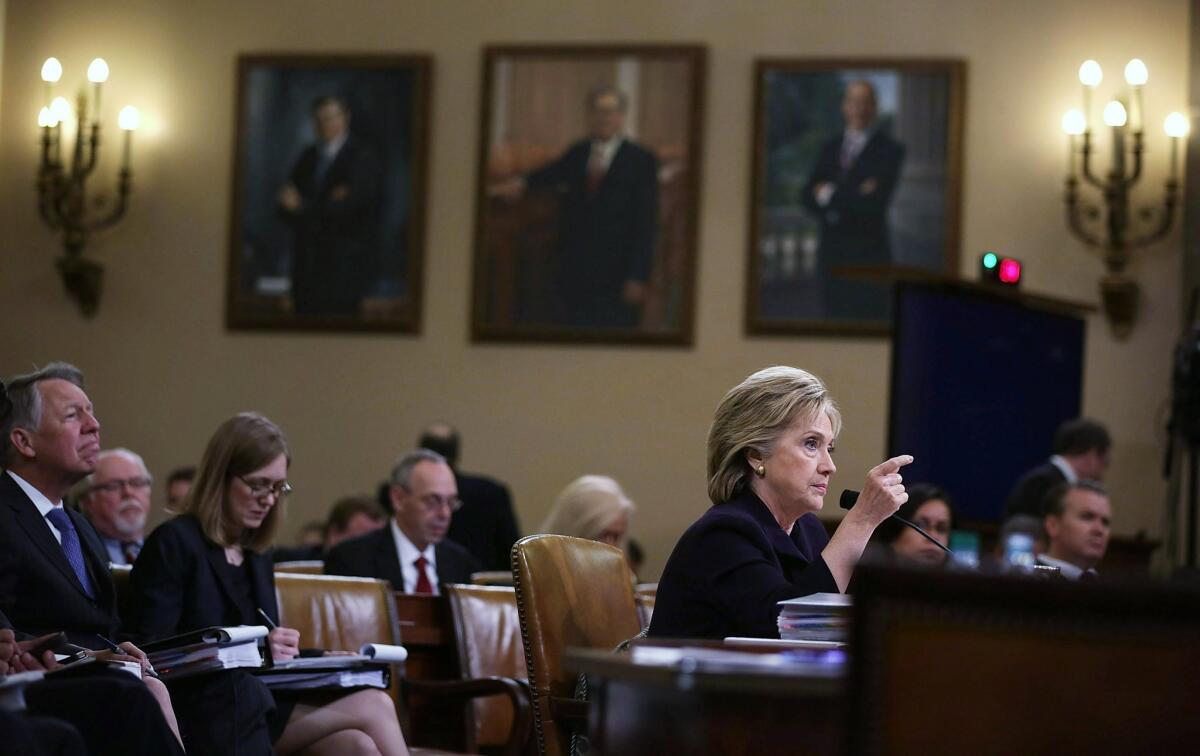
WASHINGTON, DC - OCTOBER 22: Democratic presidential candidate and former Secretary of State Hillary Clinton testifies before the House Select Committee on Benghazi October 22, 2015 on Capitol Hill in Washington, DC. The committee held a hearing to continue its investigation on the attack that killed Ambassador Chris Stevens and three other Americans at the diplomatic compound in Benghazi, Libya, on the evening of September 11, 2012. (Photo by Alex Wong/Getty Images) ** OUTS - ELSENT, FPG, CM - OUTS * NM, PH, VA if sourced by CT, LA or MoD **
The 12 members of the Select Committee on Benghazi sitting on the dais aren't the only members of Congress in the hearing room.
Sen. Joe Manchin said he wanted to see the tone of the hearing for himself. The West Virginia Democrat said he did not see a constructive proceeding as he left the chamber.
"We're talking about four lives," he said. "If there's a problem, let's fix it. If there's a security breach, let's makes sure that we stop that. If there's people's lives in danger, let's make sure that we have the security we need to make sure it never happens again."
As Hillary Rodham Clinton testified, television cameras showed two House Democrats and members of the Congressional Black Caucus, Joyce Beatty of Ohio and Sheila Jackson Lee of Texas, over her shoulders.
Stacks of Clinton emails make their hearing debut
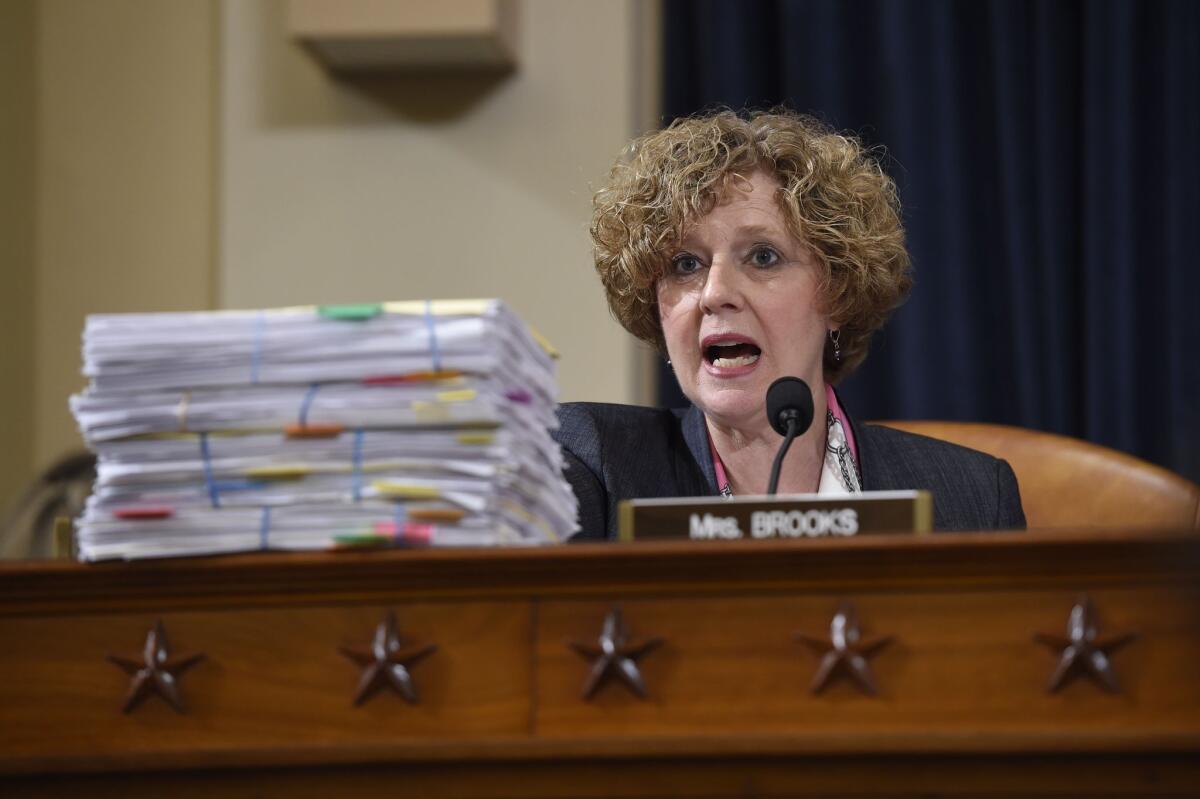
Rep. Susan Brooks, a member of the Select Committee on Benghazi speaks as former Secretary of State and Democratic Presidential hopeful Hillary Clinton testifies before the House Select Committee on Benghazi on Capitol Hill in Washington, DC, October 22, 2015. AFP PHOTO / SAUL LOEBSAUL LOEB/AFP/Getty Images ** OUTS - ELSENT, FPG, CM - OUTS * NM, PH, VA if sourced by CT, LA or MoD **
It didn't take long for some of those Hillary Rodham Clinton emails to make an appearance at the Benghazi Committee hearing, and rather theatrically at that.
Rep. Susan Brooks (R-Ind.), a former U.S. attorney, brought out two stacks of printed emails -- one that Clinton sent about Libya in 2011, and another that were sent in 2012, a year in which conditions on the ground were deteriorating and ultimately the Sept. 11 Benghazi attacks took place.
Why, Brooks wanted to know, did it seem that the situation in Libya "fell off your radar" just as the situation was getting worse, and what did it say about the "culture" she'd created at the State Department?
"I did not conduct most of the business that I did on behalf of our country on email," Clinton answered, adding that the more serious the situation, the more likely she was to be dealing with it in meetings with staff or in classified settings.
With her answer, Clinton took advantage of a key opportunity that Brooks set up for her. One of the primary arguments against Clinton using personal email rather than a government account was that it posed a risk if she were to transmit classified information on the server she kept in her home.
Clinton's answer pointed to the fact that she was far less likely to use email to begin with to address a major crisis like the Benghazi attacks.
What it's like inside the Capitol right now
Most of the people in the line that stretched down one of the longest hallways in the Capitol complex Thursday morning would not get a seat in the room where Hillary Rodham Clinton was testifying before the House Benghazi committee, meaning they might have had a better chance of watching her from their couch at home.
But they persisted, believing the dozens of television cameras crowding the halls of the Longworth House Office Building -- yes, they are marbled -- were on to something.
"This is going to be a historic hearing," said Eric Corley, 55, who said he boarded a train from New York at 3 a.m. with his friend Kyle Drosdick, 32, to get to the Capitol by about 7:30 a.m., for the 10 a.m. hearing.
Congress is used to historic moments â some real, some less so. Just a month ago, Pope Francis addressed a special session, a moment so momentous that one lawmaker was compelled to steal a glass used by the pope to sip water.
There are usually a multitude of smaller orbits of news breaking out across the corridors. Even as people geared up to hear Clinton, the Senate was debating a cybersecurity bill that would have far-reaching consequences. Reporters were staking out a meeting of the Tuesday Group, a collection of Republicans who happened to be meeting on a Thursday to discuss whether Rep. Paul Ryan should serve as speaker.
But the main action was Benghazi. Even by congressional standards, it was chaotic.
Dozens of reporters were packed against the walls near the entrance to the building and around the hearing room, roped off as they waited to snap pictures of Clinton and her associates walking in. Microphone sticks and Klieg lights sprouted above them like wild bamboo stalks. But the witness saved her voice for answering questions.
Maureen Dowd, the New York Times columnist who has feasted on Clinton stories for decades, was ushered past the throngs for a coveted seat in the chamber.
A woman in an orange prison jumpsuit wandered by in hopes of drawing attention to her belief that Clinton should be prosecuted.
Inside, members of Congress tried to maintain the dignity of the process.
In opening statement, Chairman Trey Gowdy defends Benghazi committee's work
How much has the political dynamic around the Benghazi Select Committee changed in the past month? Look at the opening statement from the panel's Republican chairman, Rep. Trey Gowdy of South Carolina.
His first words, after some initial housekeeping, were the names of the four victims of the Sept. 11, 2012, attacks at the U.S. consulate.
"We owe them â and each other â the truth," Gowdy said, before going on to repeat that word, "truth," 10 more times in a catalog of the questions his committee sought to answer.
Later, he emphasized what this committee has uncovered that previous investigations had not. From his prepared text:
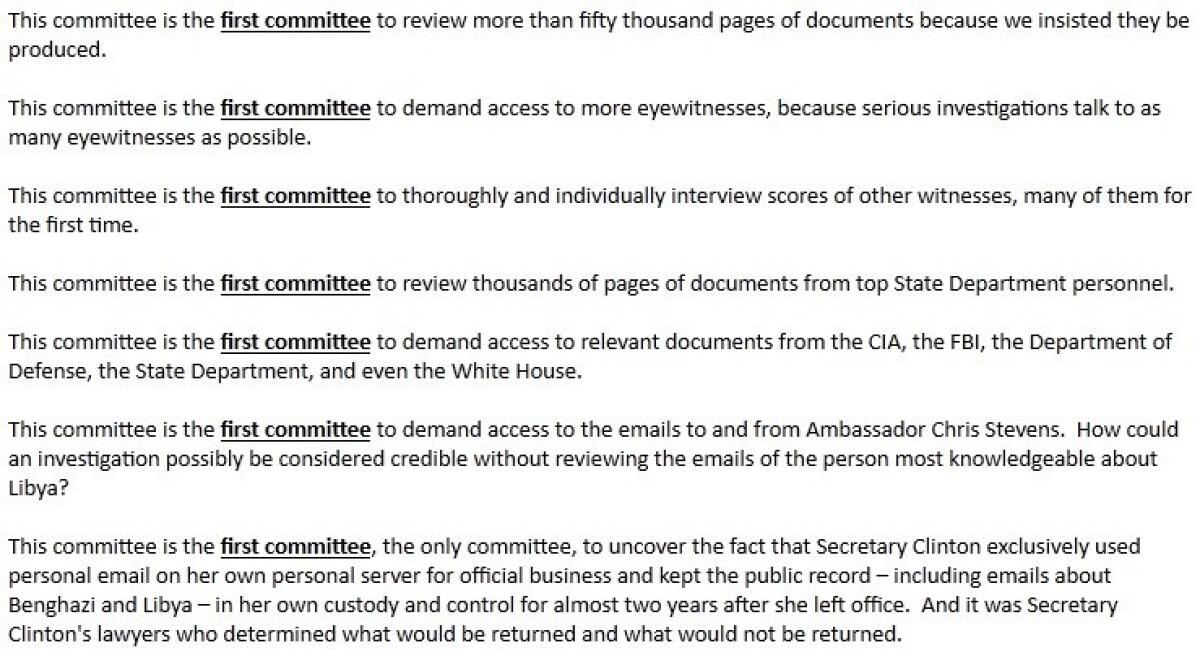
"So this committee is going to do what we pledged to do, and what should have been done long ago," Gowdy concluded. "We are going to write that final, definitive accounting of what happened in Benghazi."
What did those earlier Benghazi investigations find?
The House committee investigating the Benghazi attacks is the seventh congressional panel to look into what happened. Here's a look at what was found in those earlier probes:
Soon on Capitol Hill: Hillary Clinton returns to testify on Benghazi
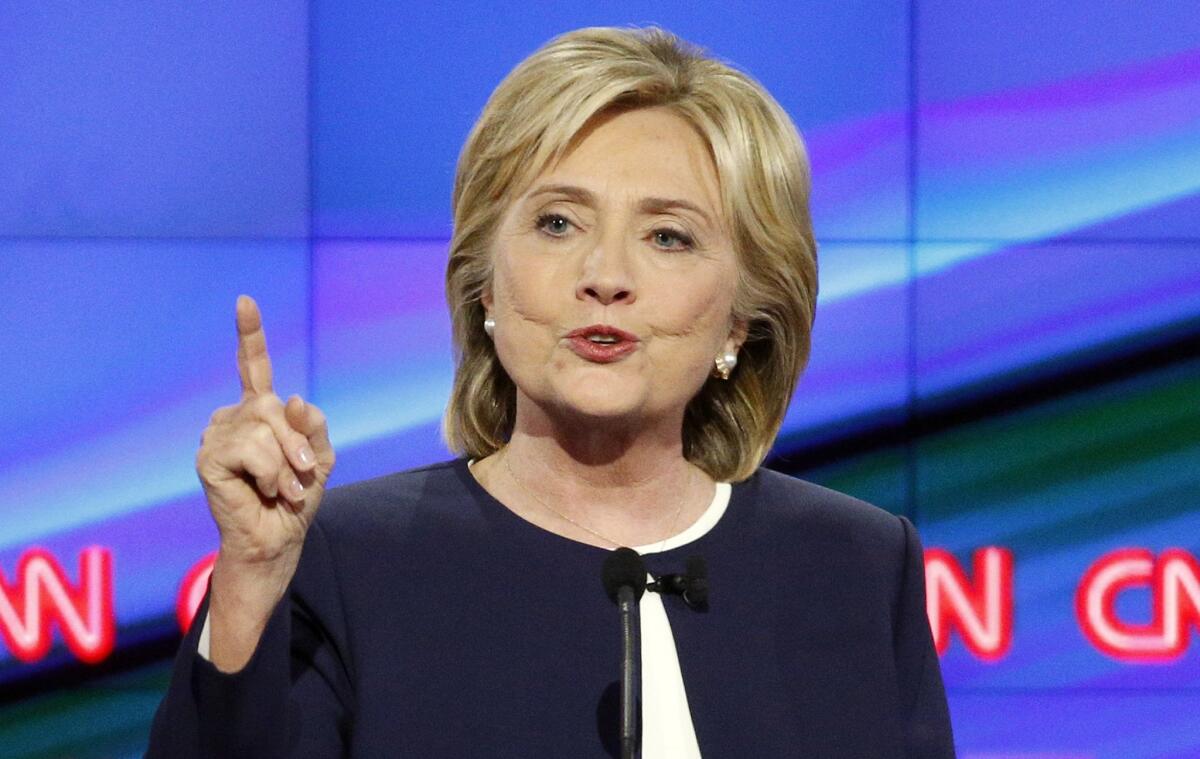
Hillary Rodham Clinton will again testify before lawmakers about the Benghazi attacks that killed four Americans.
The House Select Committee on Benghazi will fire hour upon hour of questions at Hillary Rodham Clinton today, asking about her handling of the attacks in the Libyan city in September 2012, while she was secretary of State. The violence that killed Ambassador J. Christopher Stevens and three other Americans has become one of the most dissected foreign policy mishaps of the Obama administration.
There have already been hundreds of pages of government findings published in nine reports pinpointing what went wrong and what needs to be done differently. But Republicans argue that the seven previous congressional inquisitions donât tell the full story. They are eager to lay more of the blame on Clinton. The private email server Clinton set up at her house while she served as the nationâs top diplomat has given them a fresh line of attack, and questions about why and how she used it will play big in Thursdayâs exchange.
But GOP giddiness about the panelâs work has ultimately damaged its credibility. The seven Republican lawmakers on the special committee are heading into the hearing on the defensive, after comments by some overeager colleagues â House Majority Leader Kevin McCarthy of Bakersfield, presidential candidates, Republicans in the congressional rank and file â have bolstered charges by Democrats that the inquiry is a partisan hit job.
Inside Joe Biden's decision not to run
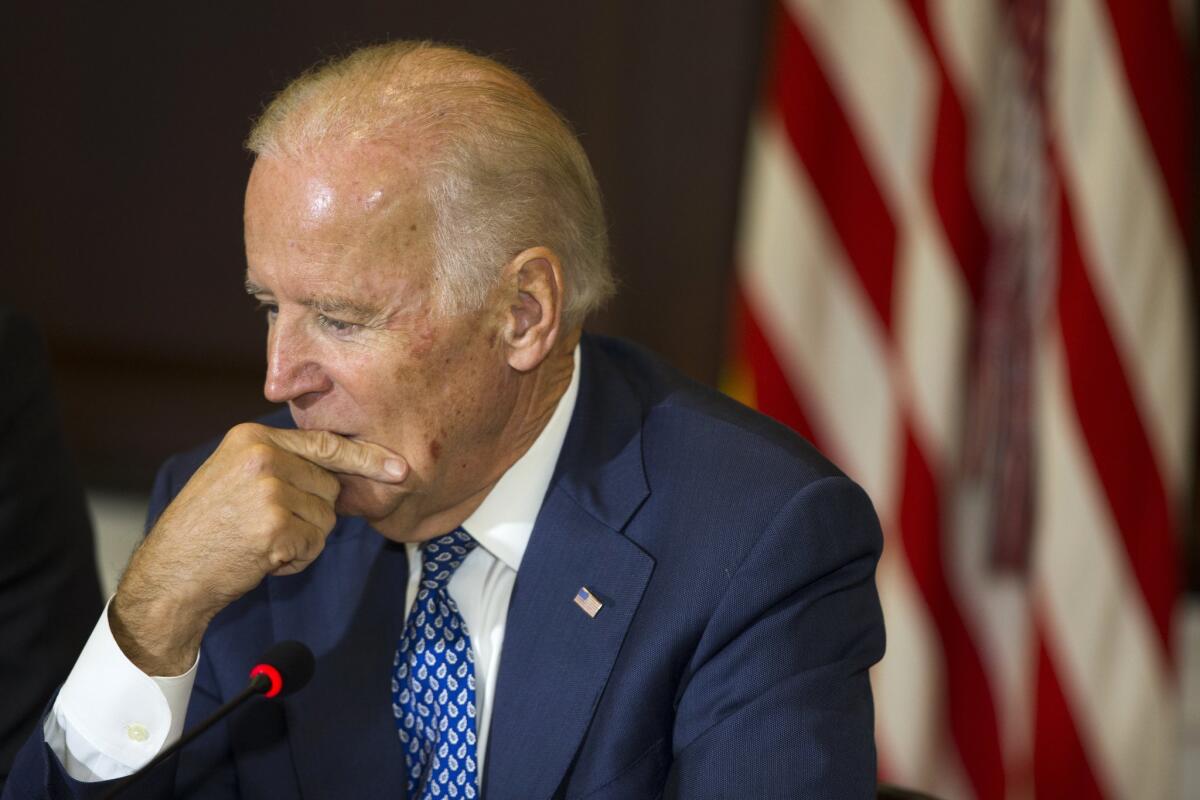
Vice President Joe Biden is pondering whether to enter the presidential race. People close to him say Biden will likely decide within days.
Staring down the question of his political future late this summer, Vice President Joe Biden and his wife began meeting with a small circle of trusted advisors, who ticked off the decisions he needed to make were he to run for president. Core staff needed to be hired soon, a fundraising infrastructure built up quickly and a support network expanded in early states where deadlines loomed.
But each time, when asked to greenlight key actions, the vice president would instead raise a yellow caution flag.
"We're just not there yet," he would say, according to a person familiar with the discussions. "My family and I are just not there yet."
Though in public Biden would often seem ready to launch his third campaign for the White House â with events that highlighted his strengths as a rampart for the middle class and veteran deal-maker â current and former aides and longtime friends suggested Wednesday that, in retrospect, the answer to the question hanging over the race for weeks was never in doubt.
Since the death of his son Beau in May, Biden wrestled with whether his family would be emotionally prepared to embark on the grueling undertaking that is a presidential campaign.
Ultimately, as Biden said Wednesday in announcing he wouldn't run, the time frame to make a decision proved too short.
Who donates to a billionaire? A look at Trump's financial backers
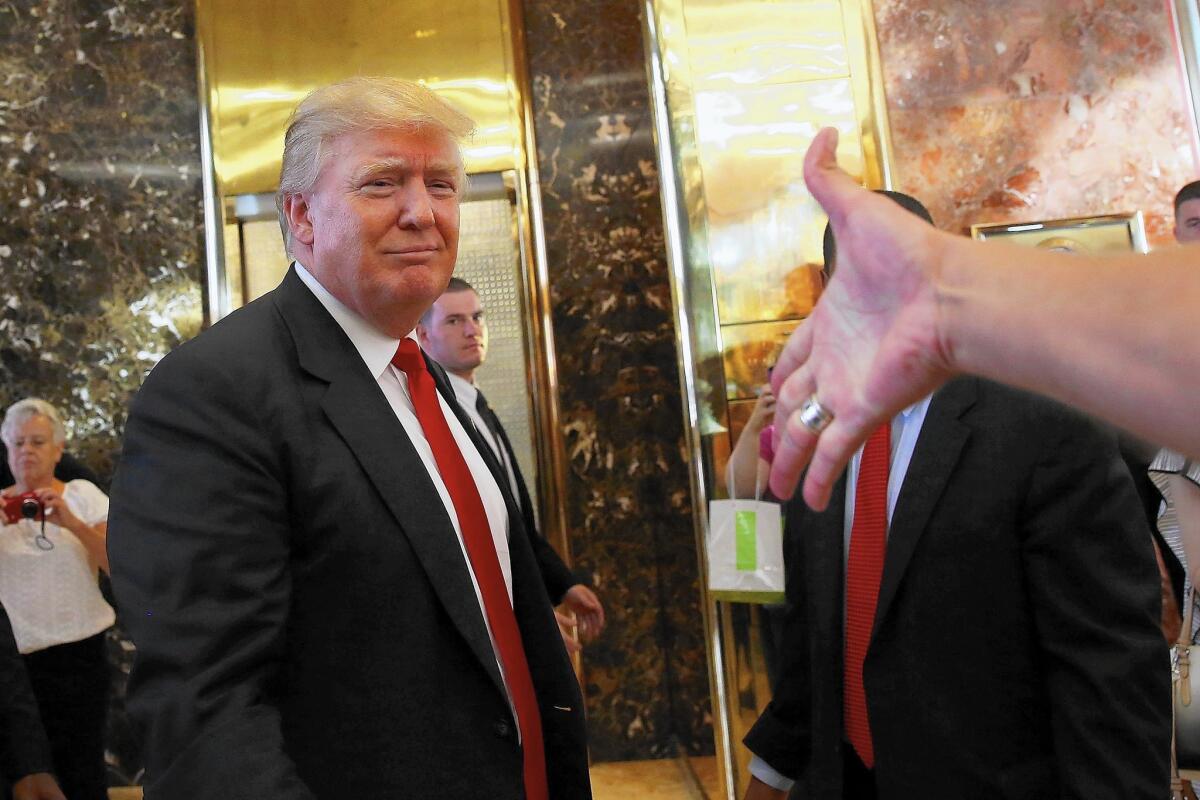
By the numbers
Get the L.A. Times Politics newsletter
Deeply reported insights into legislation, politics and policy from Sacramento, Washington and beyond. In your inbox three times per week.
You may occasionally receive promotional content from the Los Angeles Times.







